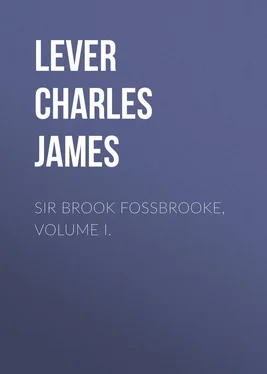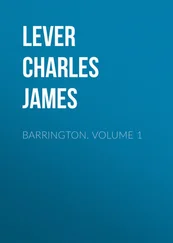Charles Lever - Sir Brook Fossbrooke, Volume I.
Здесь есть возможность читать онлайн «Charles Lever - Sir Brook Fossbrooke, Volume I.» — ознакомительный отрывок электронной книги совершенно бесплатно, а после прочтения отрывка купить полную версию. В некоторых случаях можно слушать аудио, скачать через торрент в формате fb2 и присутствует краткое содержание. Жанр: literature_19, foreign_antique, foreign_prose, на английском языке. Описание произведения, (предисловие) а так же отзывы посетителей доступны на портале библиотеки ЛибКат.
- Название:Sir Brook Fossbrooke, Volume I.
- Автор:
- Жанр:
- Год:неизвестен
- ISBN:нет данных
- Рейтинг книги:3 / 5. Голосов: 1
-
Избранное:Добавить в избранное
- Отзывы:
-
Ваша оценка:
- 60
- 1
- 2
- 3
- 4
- 5
Sir Brook Fossbrooke, Volume I.: краткое содержание, описание и аннотация
Предлагаем к чтению аннотацию, описание, краткое содержание или предисловие (зависит от того, что написал сам автор книги «Sir Brook Fossbrooke, Volume I.»). Если вы не нашли необходимую информацию о книге — напишите в комментариях, мы постараемся отыскать её.
Sir Brook Fossbrooke, Volume I. — читать онлайн ознакомительный отрывок
Ниже представлен текст книги, разбитый по страницам. Система сохранения места последней прочитанной страницы, позволяет с удобством читать онлайн бесплатно книгу «Sir Brook Fossbrooke, Volume I.», без необходимости каждый раз заново искать на чём Вы остановились. Поставьте закладку, и сможете в любой момент перейти на страницу, на которой закончили чтение.
Интервал:
Закладка:
It was late at night when Beattie returned home, and entered the study where Lendrick sat awaiting him. “I am very late, Tom,” said he, as he threw himself into an arm-chair, like one fatigued and exhausted; “but it was impossible to get away. Never in all my life have I seen him so full of anecdote, so abounding in pleasant recollections, so ready-witted, and so brilliant. I declare to you that if I could but recite the things he said, or give them even with a faint semblance of the way he told them, it would be the most amusing page of bygone Irish history. It was a grand review of all the celebrated men whom he remembered in his youth, from the eccentric Lord Bristol, the Bishop of Down, to O’Connell and Shiel. Nor did his own self-estimate, high as it was, make the picture in which he figured less striking, nor less memorable his concluding words, as he said, ‘These fellows are all in history, Beattie, – every man of them. There are statues to them in our highways, and men visit the spots that gave them birth; and here am I, second to none of them. Trinity College and the Four Courts will tell you if I speak in vanity; and here am I; and the only question about me is, when I intend to vacate the bench, when it will be my good pleasure to resign – they are not particular which – my judgeship or my life. But, sir, I mean not to do either; I mean to live and protest against the inferiority of the men around me, and the ingratitude of the country that does not know how to appreciate the one man of eminence it possesses.’ I assure you, Tom, vain and insolent as the speech was, as I listened I thought it was neither. There was a haughty dignity about him, to which his noble bead and his deep sonorous voice and his commanding look lent effect that overcame all thought of attributing to such a man any over-estimate of his powers.”
“And this note that he wished to show you, – what was it?”
“Oh, the note was a few lines written in an adjoining room by Balfour, the Viceroy’s secretary. It seems that his Excellency, finding all other seductions fail, thought of approaching your father through you.”
“Through me! It was a bright inspiration.”
“Yes; he sent Balfour to ask if the Chief Baron would feel gratified by the post of Hospital Inspector at the Cape being offered to you. It is worth eight hundred a year, and a house.”
“Well, what answer did he give?” asked Lendrick, eagerly.
“He directed Balfour, who only saw Lady Lendrick, to reduce the proposal to writing. I don’t fancy that the accomplished young gentleman exactly liked the task, but he did not care to refuse, and so he sat down and wrote one of the worst notes I ever read.”
“Worst – in what way?”
“In every way. It was scarcely intelligible, without a previous knowledge of its contents, and so worded as to imply that when the Chief Baron had acceded to the proposal, he had so bound himself in gratitude to the Government that all honorable retreat was closed to him. I wish you saw your father’s face when he read it. ‘Beattie,’ said he, ‘I have no right to say Tom must refuse this offer; but if he should do so, I will make the document you see there be read in the House, and my name is not William Lendrick if it do not cost them more than they are prepared for. Go now and consult your friend;’ it was so he called you. ‘If his wants are such that this place is of consequence to him, let him accept it. I shall not ask his reasons for whatever course he may take. My reply is already written, and to his Excellency in person.’ This he said in a way to imply that its tone was one not remarkable for conciliation or courtesy.
“I thought the opportunity a favorable one to say that you were in town at the moment, that the accounts of his illness had brought you up, and that you were staying at my house.
“‘The sooner will you be able to communicate with him, sir,’ said he, haughtily.”
“No more than that!”
“No more, except that he added, ‘Remember, sir, his acceptance or his refusal is to be his own act, not to be intimated in any way to me, nor to come through me.’”
“This is unnecessary harshness,” said Lendrick, with a quivering lip; “there was no need to tell me how estranged we are from each other.”
“I fancied I could detect a struggle with himself in all his sternness; and his hand trembled when I took it to say ‘good-bye.’ I was going to ask if you might not be permitted to see him, even for a brief moment; but I was afraid, lest in refusing he might make a reconciliation still more remote, and so I merely said, ‘May I leave you those miniatures I showed you a few days ago? ‘His answer was, ‘You may leave them, sir.’
“As I came down to the hall, I met Lady Lendrick. She was in evening dress, going out, but had evidently waited to Catch me as I passed.
“‘You find the Chief much better, don’t you?’ asked she. I bowed and assented.. ‘And he will be better still,’ added she, ‘when all these anxieties are over.’ She saw that I did not or would not apprehend her meaning, and added, ‘I mean about this resignation, which, of course, you will advise him to. The Government are really behaving so very well, so liberal, and withal so delicate. If they had been our own people, I doubt if they would have shown anything like the same generosity.’
“‘I have heard of nothing but the offer to Dr. Lendrick,’ said I.
“She seemed confused, and moved on; and then recovering herself, said, ‘And a most handsome offer it is. I hope he thinks so.’
“With this we parted, and I believe now I have told you almost word for word everything that occurred concerning you.”
“And what do you say to all this, Beattie?” asked Lendrick, in a half-sad tone.
“I say that if in your place, Tom, I would accept. It may be that the Chief Baron will interpose and say, Don’t go; or it may be that your readiness to work for your bread should conciliate him; he has long had the impression that you are indisposed to exertion, and too fond of your own ease.”
“I know it, – I know it; Lady Lendrick has intimated as much to me.”
“At all events, you can make no mistake in entertaining the project; and certainly the offer is not to be despised.”
“It is of him, and of him alone, I am thinking, Beattie. If he would let me see him, admit me once more on my old terms of affection, I would go anywhere, do anything that he counselled. Try, my dear friend, to bring this about; do your best for me, and remember I will subscribe to any terms, submit to anything, if he will only be reconciled to me.”
“It will be hard if we cannot manage this somehow,” said Beattie; “but now let us to bed. It is past two o’clock. Good-night, Tom; sleep well, and don’t dream of the Cape or the Caffres.”
CHAPTER VII. THE FOUNTAIN OF HONOR
That ancient and incongruous pile which goes by the name of the Castle in Dublin, and to which Irishmen very generally look as the well from which all honors and places flow, is not remarkable for either the splendor or space it affords to the inmates beneath its roof. Upheld by a great prestige perhaps, as in the case of certain distinguished people, who affect a humble exterior and very simple belongings, it may deem that its own transcendent importance has no need of accessories. Certainly the ugliness of its outside is in noway unbalanced by the meanness within; and even the very highest of those who claim its hospitality are lodged in no-princely fashion.
In a corner of the old red brick quadrangle, to the right of the state entrance, in a small room whose two narrow windows looked into a lane, sat a very well-dressed young-gentleman at a writing-table. Short, and disposed to roundness in face as well as figure, Mr. Cholmondely Balfour scarcely responded in appearance to his imposing name. Nature had not been as bountiful, perhaps, as Fortune; for while he was rich, well born, and considerably gifted in abilities, his features were unmistakably common and vulgar, and all the aids of dress could not atone for the meanness in his general look. Had he simply accepted his image as a thing to be quietly borne and submitted to, the case might not have been so very bad; but he took it as something to be corrected, changed, and ameliorated, and the result was a perpetual struggle to make the most ordinary traits and commonplace features appear the impress of one on whom Nature had written gentleman. It would have been no easy task to have imposed on him in a question of his duty. He was the private secretary of the Viceroy, who was his maternal uncle. It would have been a tough task to have misled or deceived him in any matter open to his intelligence to examine; but upon this theme there was not the inventor of a hair-wash, a skin-paste, a whisker-dye, or a pearl-powder that might not have led him captive. A bishop might have found difficulty in getting audience of him, – a barber might have entered unannounced; and while the lieutenant of a county sat waiting in the antechamber, the tailor, with a new waistcoat pattern, walked boldly into the august presence. Entering life by that petite porte of politics, an Irish office, he had conceived a very humble estimate of the people amongst whom he was placed. Regarding his extradition from Whitehall and its precincts as a sort of probationary banishment, he felt, however, its necessity; and as naval men are accredited with two years of service for every one year on the coast of Africa, Mr. Balfour was aware that a grateful Government could equally recognize the devotion of him who gave some of the years of his youth to the Fernando Po of statecraft.
Читать дальшеИнтервал:
Закладка:
Похожие книги на «Sir Brook Fossbrooke, Volume I.»
Представляем Вашему вниманию похожие книги на «Sir Brook Fossbrooke, Volume I.» списком для выбора. Мы отобрали схожую по названию и смыслу литературу в надежде предоставить читателям больше вариантов отыскать новые, интересные, ещё непрочитанные произведения.
Обсуждение, отзывы о книге «Sir Brook Fossbrooke, Volume I.» и просто собственные мнения читателей. Оставьте ваши комментарии, напишите, что Вы думаете о произведении, его смысле или главных героях. Укажите что конкретно понравилось, а что нет, и почему Вы так считаете.












